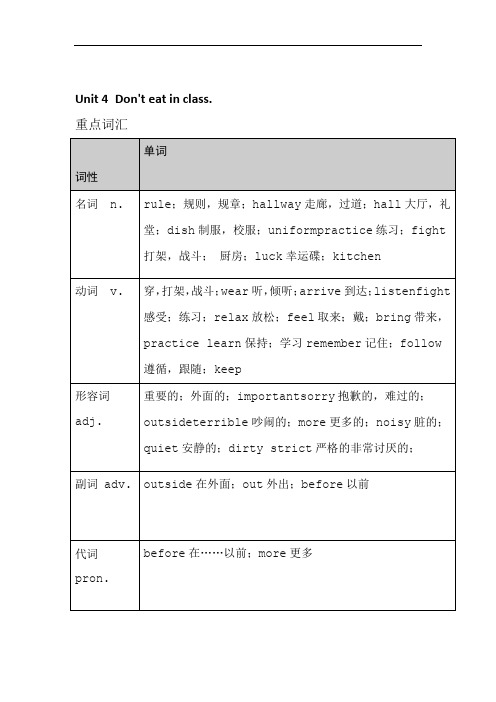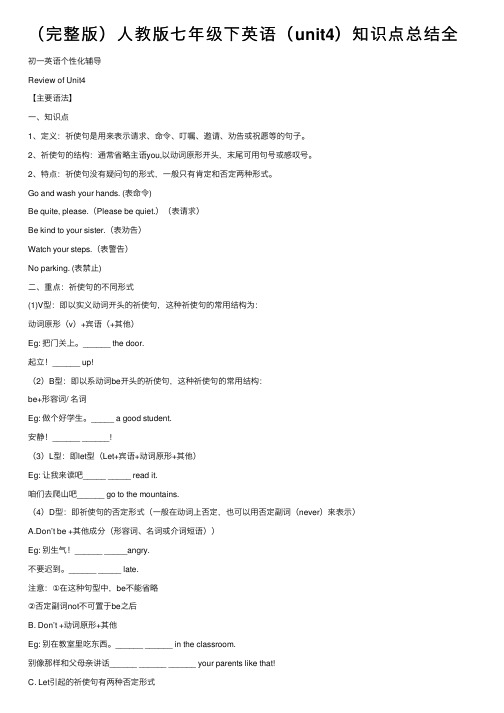(完整版)人教版七年级下英语(unit4)知识点总结全
人教版七年级下册英语unit4知识点+经典练习题

人教版七年级下册英语unit4知识点+经典练习题人教版七年级下册英语unit4 知识点+经典练习题Unit4.Don’t run in the hall way!One:重点词组1.class rules班规;school rules校规;a lot of/lots of rules许多规则;make rules制定规则;follow the rules遵守规则;wear schol uniforms穿校服;wear a hat戴帽子;listen to(the music\the tape)听音乐/听磁带;watch the video/DVD/VCD.观看---;eat in the dinning hall在餐厅吃饭;fight with others与别人打架;run in the hall way在大厅过道跑步;2.arrive late for class上课迟到;be late for class上课迟到;be late for school上学迟到;be quiet安静的;be noisy吵闹的;make the /your bed整理床铺;talk aloud/loudly大声交谈;make much noise大声喧哗;relax yourself放松你自己;3. Too many/too much太多;on school nights在学校的晚上;make dinner做饭;on time准时;Have to---必须,不得不;Two:重点句型1. don’t +v! 请不要---(否定祈使句)(1)Please don’t run in the hall way!请别在大厅过道跑步!(2)Don’t fight with others,please.请不要和别人打架!(3)Don’t make much noise吵杂声at the library!别在图书馆发出吵闹声!(4)Don’t talk aloud/loudly in class!请别在课堂上大声交谈!(5)Don’t listen to music in class!请别在课堂上听音乐!(6)Don’t eat in the classroom,plea se!请别在教室吃东西!(7)Please don’t arrive late for class\school!上学/课请不要迟到!Please don’t be l ate for class/school.(8)Tom,please don’t read in bed!(9)Don’t be noisy!请不要吵闹!(10)Please be quiet!请保持安静!2.-What are the rules?/-We must be on time for class.3.-What are the school rules?有哪些校规啊?-What are the class rules?有哪些班规啊?4.What do you have to do?你一定得做什么啊?5.-Can we (eat in the clsssroom/wear a hat in class)?我们必须---吗?6.-Do you have to get to school before 8am?-Does she have to wear a uniform at school?7(1)There are lots of things to do.There are lots of things you can do.你有许多事情可以做(2)They make rules to help us,we have to follow these rules.(3)You should listen to music to relax yourself.你应当听音乐来放松一下你自己。
人教版七年级英语下册Unit4 要点详解1

Don ’t eat in class.要点详解1. arrive, reach, get以上三词均可表示“到达、抵达”之意,但用法不同。
arrive 后接at (小地方)或in (大地方——城市、国家)reach 直接连“某地”,get 加to 后再接某地。
如:I arrived in Beijing yesterday.They reached the Great Wall by bus.How can I get to the TV station?若要表示“到家/这儿/那儿”时,用arrive / reach / get 均可。
即:arrive / reach / get home / here / there2. in class 和in the classin class 表示“在上课”,而in the class 表示“在班上”。
Don’t talk in class.上课时不要谈话。
There are 40 students in the class.这个班有40位学生。
类似的短语还有:at table at the table in hospital in the hospital out of question out of the question in front of in the front of 在进餐在桌上(生病等)住院在医院毫无疑问不可能的在……的前面在……的前部⎧⎨⎩⎪⎧⎨⎩⎪⎧⎨⎩⎪⎧⎨⎩⎪3. have to 和mustmust 表示“必须、应该”,是从主观出发的,同时must 意味着一种“责任”与“义务”。
如:We must help our parents do some housework.have to “必须”“不得不”,常表示受外界环境、条件所迫要做的事。
如:There is nothing in the fridge. I have to go shopping now.4. else 其他的else 表示“其他的,此外”,常被置于特殊疑问句、不定代词之后。
人教版七级下英语Unit 4 Dont eat in class单元知识复习总结

Unit 4Don't eat in class. 重点词汇重点短语Section A1.in class在课堂上2.arrive late for class=be late for class上课迟到3.on time准时4.in the hallways在走廊里5.in the dining hall在餐厅里6.listen to听7.at school在学校8.be late迟到9.music player音乐播放器10.bring...to school 把……带到学校来不得不做have to do.11.12.wear a school uniform穿校服13.be quiet安静Section B14.go out外出15.on school nights在上学期间的晚上16.practice the guitar练吉他17.do the dishes清洗餐具18.make breakfast做早饭19.make one's bed整理床铺20.leave sth.in...把……丢在……里21.read a book看书22.think about考虑23.make rules制订规则24.follow the rules遵守规则25.Good luck!祝好运!26.keep sth.+adj.使……保持……状态重点句型1.Don't eat in class.在课堂上不准吃东西。
2.Don't arrive late for class.You must be on time.不准上课迟到,务必守时。
3.Don't run in the hallways.不准在走廊内乱跑。
4.Don't eat in the classroom.You must in the dining hall.不准在教室里吃东西,务必在餐厅里吃东西。
5.Don't listen to music in class.不准在课堂上听音乐。
(完整版)人教版七年级下英语(unit4)知识点总结全

(完整版)⼈教版七年级下英语(unit4)知识点总结全初⼀英语个性化辅导Review of Unit4【主要语法】⼀、知识点1、定义:祈使句是⽤来表⽰请求、命令、叮嘱、邀请、劝告或祝愿等的句⼦。
2、祈使句的结构:通常省略主语you,以动词原形开头,末尾可⽤句号或感叹号。
2、特点:祈使句没有疑问句的形式,⼀般只有肯定和否定两种形式。
Go and wash your hands. (表命令)Be quite, please.(Please be quiet.)(表请求)Be kind to your sister.(表劝告)Watch your steps.(表警告)No parking. (表禁⽌)⼆、重点:祈使句的不同形式(1)V型:即以实义动词开头的祈使句,这种祈使句的常⽤结构为:动词原形(v)+宾语(+其他)Eg: 把门关上。
______ the door.起⽴!______ up!(2)B型:即以系动词be开头的祈使句,这种祈使句的常⽤结构:be+形容词/ 名词Eg: 做个好学⽣。
_____ a good student.安静!______ ______!(3)L型:即let型(Let+宾语+动词原形+其他)Eg: 让我来读吧_____ _____ read it.咱们去爬⼭吧______ go to the mountains.(4)D型:即祈使句的否定形式(⼀般在动词上否定,也可以⽤否定副词(never)来表⽰)A.Don’t be +其他成分(形容词、名词或介词短语))Eg: 别⽣⽓!______ _____angry.不要迟到。
______ _____ late.注意:①在这种句型中,be不能省略②否定副词not不可置于be之后B. Don’t +动词原形+其他Eg: 别在教室⾥吃东西。
______ ______ in the classroom.别像那样和⽗母亲讲话______ ______ ______ your parents like that!C. Let引起的祈使句有两种否定形式a. Let+宾语+not+动词原形+其他Let her not do that.Let’s not think about it. It’s only a waste of time.b. Don’t+ let+宾语+动词原形+其他Don’t let Jim do that.Don’t let us go, please.三、难点:1、特殊形式的祈使句(1)在公共场合的提⽰语中,否定祈使句常⽤“No+名词/ V-ing形式”结构,表⽰“禁⽌做某事”。
人教版七下英语unit4语法知识点

人教版七下英语unit4语法知识
点
wear v.穿着:戴着(状态)接衣帽、饰物等 wear a
skirt/hat/watch wear masks戴口罩 wear a smile面带微笑put on穿上;戴上(动作) Put on your sweater!穿上你的毛衣!
Section A
important adj.重要的 it s important for sb.to do sth.做某事对某人来说是重要的 It's very important for us to wear masks now.现在戴口罩对我们来说是非常重要的。
importance n.重要性 the importance of health健康的重
要性
quiet adj.形容词安静的(修饰n.或放be/系动词后)
quite adv.副词很,非常(相当于very) be quiet/keep quiet/stay保持安静 We have to be/keep quiet in the library.在图书馆里我们必须保持安静
情态动词must表示“必须;务必用法:主语+must+动词原形+其他例句:You must wear the school uniform at school。
七下英语第四单元知识点归纳

七下英语第四单元知识点归纳English:In the fourth unit of seventh grade English, students learn about different ways to express future events, such as using will, going to, and present continuous. They also study vocabulary related to school subjects, school events, and future careers. Additionally, students learn how to make predictions using modal verbs like may, might, and could. In terms of grammar, students are introduced to the concept of countable and uncountable nouns, as well as how to use some and any correctly. They also practice using imperatives, such as giving advice or making suggestions. Lastly, students explore the theme of future aspirations and goals, discussing what they hope to achieve in the future and how they plan to make their dreams a reality.中文翻译:在七年级英语的第四单元中,学生学习了表达未来事件的不同方式,例如使用will、going to和现在进行时。
新版(人教版)七年级(下)英语Unit4课文详解
Unit 4 Don’t eat in class.Section A 2a—2d ( P20 )* 教师寄语:No rules, no standards. 没有规矩,不成方圆。
【学习目标】【学习重点】:1、学习掌握本节课的生词和短语;2、巩固祈使句的用法;3、学习情态动词can表示许可的肯定句、否定句、一般疑问句及肯定、否定回答。
4、提高学生的听说能力。
【体验学习】:I、预习交流1. 根据音标拼读单词并牢记;2. 自学课文,勾画出重点和疑惑。
II、翻译官1. eat outside ________________2. wear a hat ___________________3. a lot of ___________________4. be late for class_______________5. 不得不__________________6. 穿校服_____________________7. 保持安静________________【课堂导学】:I、新课呈现Step1 RevisionReview the school rules at P19.Step2 PresentationPresent key sentences in this period.This is a great school, but there are a lot of rules.Can we bring music players to school?And we always have to wear the school uniform.And we also have to be quiet in the library.Step3 ListeningListen and finish 2a and 2b. Check the answers.Step4 Pair workTalk about the rules in 2a.Step5 Role-playRole-play the conversation in 2d.II、合作交流Group work: 分析总结情态动词can的用法,并练习造句。
七下英语书笔记第四单元人教版
七下英语书笔记第四单元人教版
第四单元是七年级下册英语课本中的一个单元,主要讲述的是
关于“What’s the best movie theater?”这个话题。
在这个单元中,学生将学习如何询问和描述不同事物的优劣,并学习使用形容
词的比较级和最高级。
以下是这个单元的一些重点内容:
1. 词汇,学生将学习一些关于电影院、电影类型以及形容词的
词汇,比如“comfortable, expensive, exciting, boring”等。
2. 语法,这个单元将介绍形容词的比较级和最高级的用法,以
及一些表示比较的词语,比如“than, as…as”等。
3. 对话,学生将学习如何进行询问和回答关于电影院的问题,
比如“Which is the best movie theater?” “Why do you think so?”。
4. 阅读,学生将阅读一些关于不同电影院的描述,了解不同人
的观点和看法。
5. 写作,学生将学习如何写一篇关于自己喜欢的电影院的短文,
描述其特点和优势。
总的来说,这个单元旨在通过让学生学习如何描述和比较事物,提高他们的英语口语和书面表达能力。
同时,也能让学生了解到不
同人的观点和看法,培养他们的分析和表达能力。
希望这些信息能
帮助到你。
(完整版)人教版英语七年级下册第四单元短语语法知识点总结及练习
(完整版)人教版英语七年级下册第四单元短语语法知识点总结及练习Unit 4Don’t eat in class【短语归纳】1.on time 准时,按时2. listen to …听……3. in class 在课上4. be late for 做……迟到5. have to 不得不6. be quiet安静7. go out外出8. do the dishes 清洗餐具9. make breakfast 做早饭10. make (one’s) bed 铺床11. be noisy 吵闹12. keep one’s hair short 留短发13. play with sb. 和某人一起玩14. play the piano 弹钢琴15. have fun 玩得高兴16. make rules 制订规则【用法集萃】1.Don’t + 动词原形+其他,不要做某事。
2.help sb. (to) do sth. 帮助某人做某事3.too many + 可数名词复数太多的……4.practice doing sth. 练习做某事5. be strict with sb. 对某人要求严格6. be strict in sth. 对某事要要求严格7. leave sth sp. 把某物忘在某地8. keep + 宾语+形容词使……保持某种状态9. learn to do sth. 学会做某事10. have to do sth. 不得不做某事┃语法探究┃┃.祈使句定义:用于表达命令、请求、劝告、警告、禁止等的句子叫__________句。
时态:使用______________时态。
结构:动词原形+其他成分+please. 否定祈使句在动词原形前面加__________ 。
如:Be quiet in the classroom, please.在教室里请保持安静。
Don't fight. 不要打架┃.情态动词have to 和must1.情态动词have to和must都表示“__________”的意思。
人教版英语初一下学期第四单元知识点大总结
人教版英语初一下学期第四单元知识点大总结人教版英语初一下学期第四单元主要讲述了以下几个知识点:1. 表示能力和无能力:- 表示能力:can(肯定句)、be able to(否定句和疑问句) e.g. I can swim.(我会游泳。
)She is able to play the piano.(她会弹钢琴。
)注意:在否定句和疑问句中,can要用be able to来替代。
- 表示无能力:cannot(或can’t)e.g. I cannot sing.(我不会唱歌。
)2. 表示意愿和打算:- 意愿:would like to(或want to)e.g. I would like to go shopping.(我想去购物。
)They want to watch a movie.(他们想看电影。
)- 打算:be going toe.g. I am going to visit my grandparents tomorrow.(我明天要去看望我的祖父母。
)3. 第一时间提出建议:- Shall we... ?e.g. Shall we go for a walk?(我们出去散散步好吗?)4. 英文缩写:- 单词缩写:I'm(I am)、isn't(is not)、that's(that is)等 - 月份缩写:Jan.(January)、Feb.(February)等5. 短语和句型:- in the swimming pool(在游泳池里) - go camping(去露营)- have a good time(过得愉快)- fly kites(放风筝)- take a walk(散步)- the day after tomorrow(后天)- next month(下个月)。
- 1、下载文档前请自行甄别文档内容的完整性,平台不提供额外的编辑、内容补充、找答案等附加服务。
- 2、"仅部分预览"的文档,不可在线预览部分如存在完整性等问题,可反馈申请退款(可完整预览的文档不适用该条件!)。
- 3、如文档侵犯您的权益,请联系客服反馈,我们会尽快为您处理(人工客服工作时间:9:00-18:30)。
初一英语个性化辅导Review of Unit4【主要语法】一、知识点1、定义:祈使句是用来表示请求、命令、叮嘱、邀请、劝告或祝愿等的句子。
2、祈使句的结构:通常省略主语you,以动词原形开头,末尾可用句号或感叹号。
2、特点:祈使句没有疑问句的形式,一般只有肯定和否定两种形式。
Go and wash your hands. (表命令)Be quite, please.(Please be quiet.)(表请求)Be kind to your sister.(表劝告)Watch your steps.(表警告)No parking. (表禁止)二、重点:祈使句的不同形式(1)V型:即以实义动词开头的祈使句,这种祈使句的常用结构为:动词原形(v)+宾语(+其他)Eg: 把门关上。
______ the door.起立!______ up!(2)B型:即以系动词be开头的祈使句,这种祈使句的常用结构:be+形容词/ 名词Eg: 做个好学生。
_____ a good student.安静!______ ______!(3)L型:即let型(Let+宾语+动词原形+其他)Eg: 让我来读吧_____ _____ read it.咱们去爬山吧______ go to the mountains.(4)D型:即祈使句的否定形式(一般在动词上否定,也可以用否定副词(never)来表示)A.Don’t be +其他成分(形容词、名词或介词短语))Eg: 别生气!______ _____angry.不要迟到。
______ _____ late.注意:①在这种句型中,be不能省略②否定副词not不可置于be之后B. Don’t +动词原形+其他Eg: 别在教室里吃东西。
______ ______ in the classroom.别像那样和父母亲讲话______ ______ ______ your parents like that!C. Let引起的祈使句有两种否定形式a. Let+宾语+not+动词原形+其他Let her not do that.Let’s not think about it. It’s only a waste of time.b. Don’t+ let+宾语+动词原形+其他Don’t let Jim do that.Don’t let us go, please.三、难点:1、特殊形式的祈使句(1)在公共场合的提示语中,否定祈使句常用“No+名词/ V-ing形式”结构,表示“禁止做某事”。
Eg: 不许停车!No parking!禁止游泳!_____ ________!不许交谈!_____ ________!(2). 在表达请求或劝告时,有时为了表示委婉的语气,可以在句首或句末please,但是如果please加在句末,应用逗号将其与前面的部分隔开。
Eg: 请进Please _____ _____. = _____ ____, please.请坐Please _____ _____. = _____ ____, please.(3). 在意思比较明显的情况下,可以把谓语动词省略。
This way, please.(4). 有时为了加强语气,可以在动词前使用do.Do be careful!一定要小心!(5). 有时为了强调对方,也可加上主语you,人名或everybody, anybody等不定代词。
You sweep the floor and I clean the window.Stand up, everybody.(6).有时为了明确向谁提出请求或发出命令,可加称呼语,但称呼语要与句子用逗号隔开。
Put the shirt on the bed, Jim.2、祈使句的回答祈使句的动作通常是表示将来发生的动作,所以回答祈使句时,一般用will 或won’t。
在回答具有否定意义的祈使句时,要注意两点:1)形式一致(即Yes与will保持一致;No与won’t保持一致)2)意思相反(即Yes是“不”的意思;No是“是”的意思)。
在回答时,要注意分析上下文语境中所提供的条件。
例如:--- Don’t go out, please. It’s raining heavily outside.请不要出去。
外面雨下得很大。
---- Yes, I will. I have to meet my brother at the airport.不行,我得去机场接我弟弟。
三、考点:祈使句用于两个重要句型中(1).“祈使句+and+表结果的陈述句”用来叙述肯定的条件。
Eg: Hurry up and you’ll catch the train.Study hard and you can make progress everyday.(2).“祈使句+or(else)+表结果的陈述句”用来叙述否定的条件,or(else)表示“否则;要不然”。
Eg: Hurry up,or you’ll miss the train.考题精选1. Please ____, they’re having a meeting.A. not be so noisyB. be quiteC. mustn’t talkD. no speaking2. ____ to meet me at the station. I’ll be waiting there.A. Not to forgetB. Not forgetC. Forget notD. Don’t forget3. –Don’t forget to come to my birthday party tomorrow. -I ____.A. don’tB. won’tC. can’tD. haven’t4. If you are tired, ______ a rest.A. haveB. havingC. to haveD. had5. ______ me go. It is very important for me.A. Do letB. Let doC. Doing letD. To do let6. He is not honest. ______ believe him.A. NotB. Don’tC. To notD. Not to7. _____ up early tomorrow, or you can’t catch the train.A. GettingB. GetC. To getD. Got8. _____ in the street. It’s dangerous.A. Not playB. Not to playC. Don’t playD. Don’t to play9. Please ______ me some money, will you?A. lendB. lendingC. borrowD. borrowing10. The film is about to begin. Please ______ seated.A. beB. areC. isD. being11. ____ down the radio. The baby’s asleep in the next room.A. TurningB. To turnC. TurnedD. Turn12. Lucy, ____ the door or someone will come in.A. closeB. closesC. not closeD. is closing13. ____ and play football in the street after lunch.A. Let’s not to goB. Let’s not goC. Let’s don’t goD. Not let’s go14. A sign with the words“____” is often found in a bus.A. Not parkingB. Not smokingC. No parkingD. No smoking15. ____ Chinese in you English class.A. Not speakB. Don’t speakC. Speak notD. Don’t speaking16 . _____ the boxes. You may use them later.A. KeepB. KeepingC. To keepD. Kept17. The TV is too loud. Please________.A. turn it downB. to turn it downC. turn down itD. to turn down it18.. _______ cross the road until the traffic lights turns green.A. NotB. Won'tC. Doesn'tD. Don't19.. Do you know the girl ______under the tree?A. standB. to standC. standingD. stood20. Kate, _______ your homework here tomorrow.A. bringB. bringsC. to bringD. bringing二. 用括号内所给动词的适当形式填空。
1. It’s an important meeting. __________ (not, be )late.2. ____________ (not,make) any noise! Your mother is sleeping.3. ____________ (not, speak) with your mouth full of food and ____________ (be) polite.4. ____________ ( not, talk) and ____________ (read) aloud.5. ____________ (not,leave) your homework for tomorrow, Larry.6. ____________ (look) out! A car is coming.7. ____________ (give) us ten years and just see what our country will be like.8. ____________ (not, let) the baby cry.9. Wear more clothes or you ____________ (catch) a cold.10. Let’s ____________ (not, say) anything about it.三、句型转换11. Will you please read it again more slowly? (改为祈使句)_____ _____ again more slowly, please.12. If you don't listen to me, I'll go. (改为同义句)_____ _____ me, or I’ll go.13. Let's watch the sports games. (改为反意疑问句)Let's watch the sports games, _____ _____?14. The teachers often tell the students not to be careless. (改为祈使句)_____ _____careless, please.15. Please sit next to Nancy. (改为否定句)_____ _____ next to Nancy.16. Don't forget to turn off the lights, please. (改为反意疑问句)Don't forget to turn off the lights, _____ _____?17. If you move, you'll die. (改为同义句)_____ _____, or you'll die.18. Come to my house tomorrow. (改为反意疑问句)Come to my house tomorrow, _____ _____?19. 这是一个坏了的被子。
